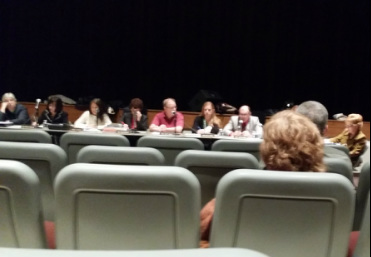
Individual administrators and school directors took turns defending themselves in response to questions related to the junior high school during Wednesday night's board meeting, which ended with at least a dozen or so residents deciding to leave.
"You don't have to talk down at us!" one woman shouted in protest after standing to leave.
Some parents who attended said afterward they felt disrespected by the tone the meeting took and felt it was best to exit.
A crowd of residents attended the board meeting to again ask questions and speak in opposition of a proposal to close the junior high and transition the seventh- and eighth-grades to the high school.
Reading from cards, Jessica Kozak of Economy posed a long list of questions to board members and administrators, directing some specifically to Zurchin, Assistant Superintendent Megan Mealie, Business Manager Mary Baker and School Director Jeremy Angus.
Junior high issues
Mealie, the former junior high school principal, was asked what her efforts were to prevent the school's deterioration for more than a decade.
"Mrs. Mealie, you were the junior high principal for 13 years," Kozak said. "What measures did you take to maintain the urgent infrastructure needs of the building?"
Mealie said when she arrived at the junior high as principal she had a punch list of things she wanted to accomplish. The school had just got a new roof the year before and the building was made ADA accessible.
"Throughout my 13 years there, we did have ongoing issues. The number one issue is the HVAC. It always has been."
Last school year, she said several companies were brought in due to issues with the HVAC and it was determined that the steam had caused damage and erosion, and the system needed to be repaired. She said every superintendent throughout her tenure knew about the issues and this time she was told the HVAC would be repaired over the summer months, but it didn't happen.
"I only have so much control, obviously, as the building principal," she said.
Business Manager Mary Baker was asked why funds from inactive accounts are being transferred to the general fund and not being used to fix the junior high. Last week, board member Roger Kowal, who lives in Economy, suggested the funds be used to help renovate the junior high.
Baker said the district is using funds from a non-interest bearing account to pay for a $1.3 million lawsuit settlement for the new high school. She said $800,000 was already paid out in November.
"In July, we have to pay out another $500,000," she said.
Charter school debate
Angus was asked why he supports Baden Academy's Facebook page, when 145 district students have left to attend the Baden-based charter school.
"Mr. Jeremy Angus, is there a reason that you support the Baden Academy charter school through social media such as Facebook. Isn't that a conflict of interest? Why are you supporting a page for the charter school, which takes millions of dollars from the Ambridge Area School District," Kozak asked.
Angus said he doesn't believe public schools are for every student and that charter schools have lit a fire under districts prompting them to create their own cyber, dance and art academies. As the president and CEO of the Prevention Network in Baden, he said he oversees an alternative school for disruptive youth, calling it another school option for students in the region.
"I believe there is a place for all of our schools, both Baden Academy and public school districts. I believe there is an opportunity for us to find where each of those belong and I think we're finally getting a chance to do that."
Zurchin was asked why the district hired Artistic Director Kenneth Nickel at the new dance academy at a higher salary than six or seven-year teachers in the district.
Kozak asked how the district could justify paying Nickel a salary of more than $50,000 to instruct five students, something the superintendent alluded to being false.
"I can't wait to tell Mr. Nickel about his new salary that he is receiving. I don't know who is giving that salary to (him)... He will be excited, he will probably just do three pirouettes for you," she said.
Alternative funding
Officials were also asked if they have looked into alternative funding sources, such as grants, green initiatives and corporate funding.
Jennifer Setzenfand of Economy said the state Energy Savings Act allows schools to enter into guaranteed savings contracts for improvements to facilities, requires little capital up front and the energy savings are used to pay back the cost of the project.
"It would appear to me that Act 39 could be the answer to fix the junior high and I really want to know why we're not visiting this option," she said
Zurchin said she has close to 30 years of experience in large districts, and has worked closely with grant writers in the Pittsburgh Public Schools. She said there are no grants out there for completing a $2 million to $5 million project.
"In my 30 years, I have never known grants that are available totally fully, no strings attached, where the district doesn't have to support any money just to give yourself a new HVAC system, a new roof. If you can find one, please send them to us."
She said she's excited to see Walmart and other ventures coming to the area, but isn't banking on millions of dollars in return.
Several in the audience stood in unison to leave when Zurchin began to liken some of the public discourse to a childhood game of telephone.
"That is what I feel like has happened," she said, before the board immediately voted to adjourn.
Like Ambridge Connection on Facebook, follow us on Twitter.




 RSS Feed
RSS Feed